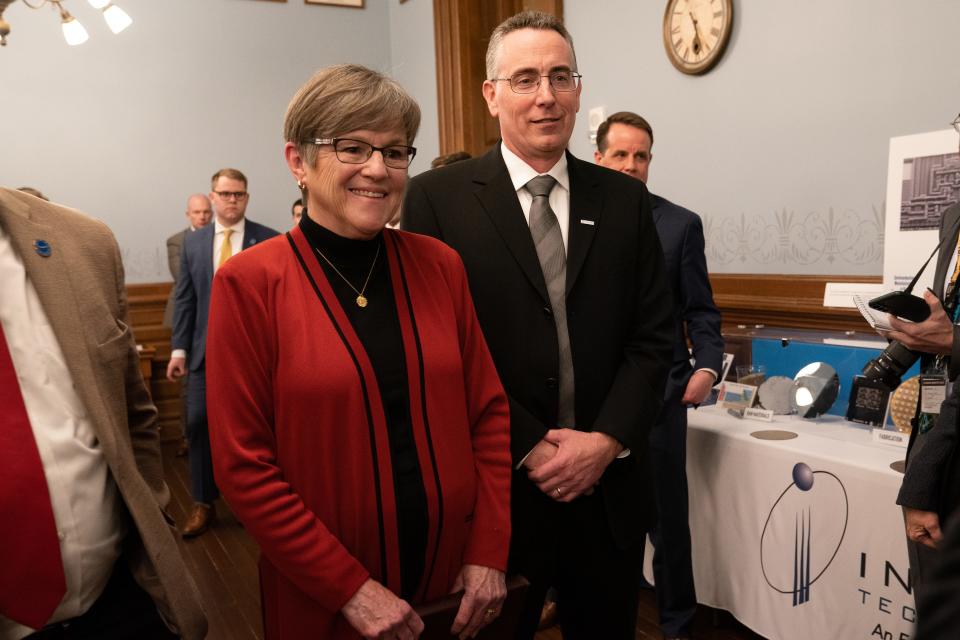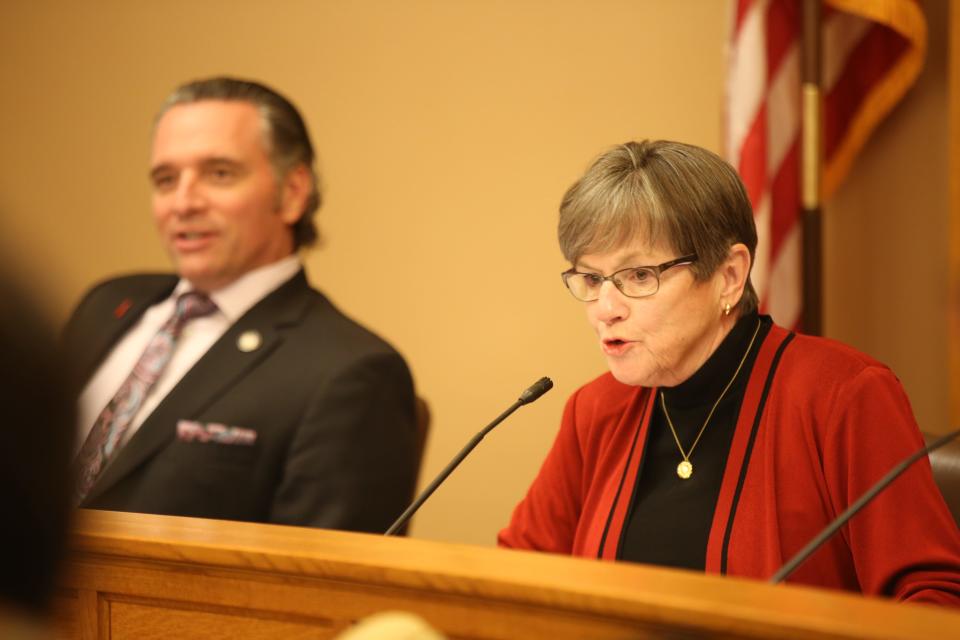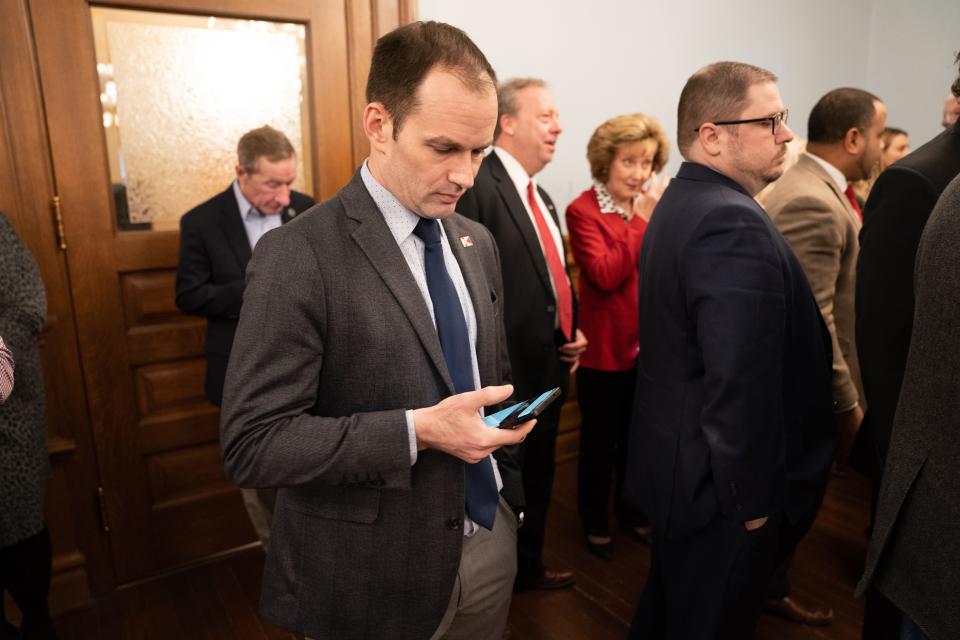Semiconductor manufacturer expanding with Kansas taxpayer incentives. Here's what we know.

Kansas will pay out over $300 million in state incentives to help boost the development of a semiconductor plant in the Wichita area, Gov. Laura Kelly announced Thursday, making it the state's second megaproject in the past six months.
Officials say the deal with Wichita-based company Integra Technologies, unveiled in a Statehouse news conference shortly after officials signed off on the agreement in a closed-door meeting, will create upward of 2,000 jobs.
The announcement bookends a July deal to entice Japanese firm Panasonic to build an electric vehicle plant in DeSoto, believed to be the state's largest economic development project to date. The Integra expansion will be the second largest.
"This investment will add one more proof point that we have put Kansas, all of Kansas on the map," Kelly said. "Companies, both homegrown and international, now look to Kansas as a place they can succeed."
But this project has a new element: the prospect of millions of dollars in federal funding from the CHIPS Act, which was designed to support a domestic microchip and semiconductor sector.
If those funds aren't secured by October, the state can withdraw the incentives and look elsewhere.
Where will semiconductor plant be?

While the plant will be in the Wichita area, officials promise the economic impact will stretch across south-central Kansas.
The project will entail a 1-million-square-foot advanced manufacturing facility, representing $1.8 billion in capital investment overall. Per the announcement, Integra must stay in the state for at least 15 years.
"As you can imagine, a 1-million-square-foot, state-of-the-art, solar-powered facility has a lot of complex site requirements," said Integra CEO Brett Robinson. "We should be able to announce a site soon, but we are finalizing the review of a couple of final sites."
Wichita Mayor Brandon Whipple said Integra will have a ripple effect on the local economy.
"It's not only a game-changer for our economy, it's a game-changer in our future," Whipple said. "This is one of the types of in-a-generational opportunities where if my kids want to work in technology, they want to make computer chips, they don't have to move to a coastal city, they can do it right here in Wichita."
How many jobs will Integra create?

Officials said the Integra deal will create 1,994 jobs, with other positions created in construction of the facility. The company says the average wage for the jobs will be around $51,000.
Per the terms of the agreement, Integra must employ at least 1,600 full-time workers each year for a decade or risk being forced to repay a proportionate amount of the state incentives.
Robinson said he is confident the company can find enough workers through partnering with Wichita area organizations and by recruiting out-of-state people.
Integra handles the final two steps of the four-part process needed to produce semiconductors, placing them in a sector dubbed OSAT. The company is the largest OSAT in the country, Robinson said.
How much Kansas taxpayer money will Integra get?
The $304 million in state incentives will flow to Integra, in addition to possible funding from the federal government via the CHIPS Act.
The largest portion of the incentives is more than $180 million in refundable tax credits stemming from the $1.8 billion capital investment.
If $1.5 billion is not invested within five years, officials said, all benefits must be paid back to the state.
More:In wake of Panasonic deal, Kansas targets potential microchip manufacturers for megaprojects
How does federal CHIPS Act affect Kansas?
Inspired by the economic ripples of the COVID-19 pandemic affecting international supply chains, Congress passed and President Joe Biden signed the CHIPS and Science Act in August. The roughly $280 billion legislation is intended to help onshore microchip manufacturing and other semiconductor work.
The law provides $52.7 billion for American semiconductor research, development, manufacturing and workforce development. That includes $39 billion specifically for manufacturing incentives. Semiconductor manufacturing would be eligible for a 25% investment tax credit for capital expenses.
Kansas Department of Commerce officials have said the application for private businesses seeking to take advantage of tax credits and other incentives will open in February and the federal government is seeking to have a decision on where the dollars will go by July, an abnormally compressed timeframe. State incentives are a necessary part of a successful application.
"There's no commercially viable way to do this project without CHIPS funding, which is the reason the CHIPS Act was passed in the first place," Robinson said.
What are megaprojects and APEX?
The Attracting Powerful Economic Expansion, or APEX, was passed in 2022 as SB 347 at the urging of the Kelly administration and buy-in from Republican and Democratic legislative leadership.
"When it comes to economic development, probably the only thing we disagree on is actually who's driving the train," said Senate President Ty Masterson, R-Andover.
But opposition from skeptical lawmakers was also bipartisan.
The legislation was hurriedly ushered through the Legislature amid secretive talks that were eventually successful in luring Panasonic to build an electric vehicle battery plant in Kansas.
The law provides state economic development incentives for megaprojects in certain industries where a firm pledges to invest at least $1 billion.
The centerpiece of the law is a a refundable 15% tax credit on the entire investment a company makes in Kansas of over $1 billion within a five-year period.
Moreover, between 7.5% and 10% of payroll costs may be refunded for the first decade of the project and a company can also see a set amount of training and relocation expenses reimbursed per year, for up to five years.
In the wake of the Panasonic deal, some have argued the state should be reticent before moving forward with another large-scale project.
While Kansas has a $2 billion-plus budget surplus, many lawmakers were hoping to use that money for tax cuts and other projects.
"We have not written the checks for this first project, and they're starting the second one without even knowing that it works," said Sen. Caryn Tyson, R-Parker. "It just doesn't make sense."
This article originally appeared on Topeka Capital-Journal: Semiconductor firm Integra to be Kansas' second megaproject deal
